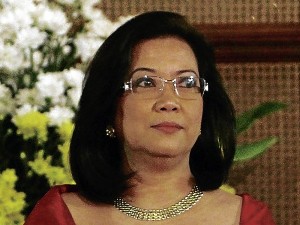MANILA, Philippines–“Should we condemn the Philippine-US Enhanced Defense Cooperation Agreement (EDCA)? Should we not give them a chance first,” Chief Justice Maria Lourdes Sereno asked anti-EDCA petitioners.
During Tuesday’s oral argument, in interpellating Atty. Rachel Pastores, counsel for one of the petitioners, Sereno said it was in fact the Armed Forces of the Philippines (AFP) which acknowledged the need to enter into such an agreement with US to address the short-term gaps in the AFPs capability as well its long term goal of modernization.
“This is the AFP saying, ‘we are looking this as an approach at filling our capabilities…’ Is it grave abuse of discretion for a government to ask an ally, with whom you have a mutual defense agreement with since the 1950’s, to fill the gaps? Promoting long-term modernization — is that bad for the AFP,” Sereno asked.
“The fact that we brought a [territorial conflict] before the ITLOS (International Tribunal for the Law of the Sea), isn’t that a fact that we must explore all means? Isn’t that the greatest threat when our fishing grounds are no longer accessible to us? I see our islands in the West Philippine Sea being overtaken. What is wrong with prepositioning? How long does it take for a missile to reach Palawan?” Sereno said.
“‘Helping maintain and develop additional maritime security, maritime domain awareness’ — so we’re talking about the West Philippine Sea problem here because we have no problem with the eastern side (of our islands), it’s with the western side… we are still in the process in making the international community aware that we are asserting our right under the UNCLOS (United Nations Convention on the Law of the Sea),” Sereno stressed.
Sereno said it is premature to challenge EDCA’s legality based on speculations and past experience.
Petitioners said EDCA essentially allows the US to set up military bases in the country which is prohibited under the Constitution except under a treaty concurred in by the Senate.
They pointed out it resurrected the 1947 military Bases Agreement, which is not renewed by the Senate in 1991 paving way for the US on agreed locations.
“EDCA allows unlimited number of troops to be stationed, together with their unlimited number of prepositioned war vessels and weapons; in unspecified and unlimited number of so-called agreed locations anywhere in the country, to be provided by the Philippine government,” Pastores said.
But Sereno said the agreement has yet to be implemented.
“We have a problem here… unless the facts [are before us], and we are not a trier of facts, we cannot presume the factual situation; we cannot paint for the people a situation where the facts are not yet presented before us.
“In other words, if we are going to presume falsity on the part of the Philippine government, then we rule that the EDCA is unconstitutional, but we don’t have that legal authority especially that there has been no hearing (on the facts),” Sereno said.
Hearing will resume on Nov. 25 with the government lawyer through Solicitor General Florin Hilba arguing.
On leave are Associate Justices Diosdado Peralta and Lucas Bersamin while Associate Justice Francis Jardeleza inhibited from the case being a former government lawyer.



